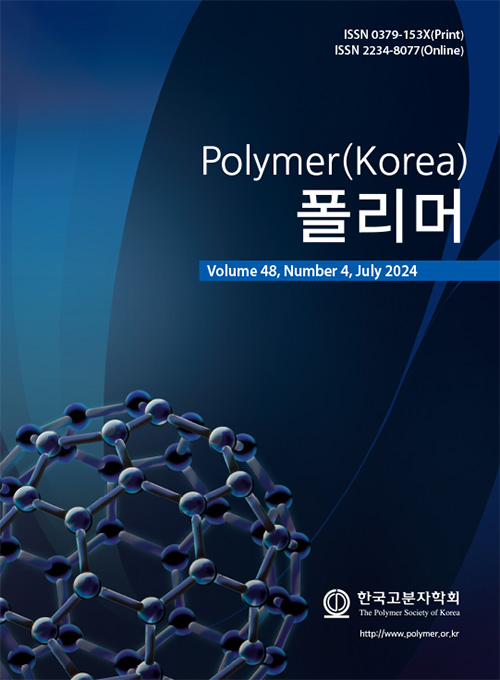- [Review]
- Microbial and Enzymes That Can Regulate Plastic Degradation
Hwicheol Shin*
 , Sojin Eem*, Soyeon An*, Dongyeop X. Oh**,†
, Sojin Eem*, Soyeon An*, Dongyeop X. Oh**,†  , and Dong-Ku Kang*, ***, ****,†
, and Dong-Ku Kang*, ***, ****,† 
*Department of Chemistry, Incheon National University, Incheon 22012, Korea
**Department of Polymer Science and Engineering and Program in Environmental and Polymer Engineering, Inha University, Incheon 22212, Korea
***Bioplastic Research Center, Incheon National University, Incheon 22012, Korea
****Research Institute of Basic Sciences, Incheon National University, Incheon 22012, Korea- 생분해성 플라스틱 분해 조절을 위한 미생물 및 효소 기술
*인천대학교 화학과, **인하대학교 고분자공학과 및 환경 고분자공학 전공, ***인천대학교 바이오 플라스틱 센터, ****인천대학교 기초과학연구소
Reproduction, stored in a retrieval system, or transmitted in any form of any part of this publication is permitted only by written permission from the Polymer Society of Korea.
Biodegradable plastics have been developed as a replacement for non-degradable plastics to respond to climate change and achieve carbon neutrality and are growing in technological and industrial terms. However, the biodegradability of biodegradable plastics does not meet what is required from user aspects, and various demands are being made to control the decomposition speed and initiating time points. Therefore, multiple studies have recently been actively conducted to accelerate the decomposition of biodegradable plastics under aerobic and anaerobic conditions, particularly research on the discovery and improvement of biodegradable microorganisms and enzymes. In this paper, we aim to provide information for controlling the decomposition of biodegradable plastics by summarizing recent research on microorganisms and the enzymes.
생분해성 플라스틱은 기후변화 대응의 일환 그리고 탄소중립 실현을 위한 기존 난분해성 플라스틱 대체제로 개발되어 기술적, 산업적 측면에서 빠르게 성장하고 있다. 그러나, 산업적 퇴비화 조건과 달리 일반적인 환경은 생분해성 플라스틱이 충분한 분해속도를 가지기에 열악한 조건으로 기존 생분해성 플라스틱의 분해 속도 조절에 대한 다양한 요구가 이루어지고 있는 실정이다. 따라서, 최근 생분해성 플라스틱의 호기 및 혐기 조건에서의 분해 가속화를 위한 다양한 연구가 활발히 이루어지고 있으며, 특히 생분해 미생물 및 효소 발굴과 이의 개량에 대한 연구가 활발히 이루어지고 있다. 본 논문에서는 최근 이루어지고 있는 생분해성 플라스틱 분해 미생물 및 이의 효소에 대한 연구에 대한 정리를 통해, 생분해성 플라스틱 분해조절을 위한 정보를 제공하고자 한다.
Keywords: biodegradable polymer, biodegradable plastic, microbial, enzyme, plastic digestion.
- Polymer(Korea) 폴리머
- Frequency : Bimonthly(odd)
ISSN 0379-153X(Print)
ISSN 2234-8077(Online)
Abbr. Polym. Korea - 2023 Impact Factor : 0.4
- Indexed in SCIE
 This Article
This Article
-
2024; 48(4): 345-360
Published online Jul 25, 2024
- 10.7317/pk.2024.48.4.345
- Received on May 24, 2024
- Revised on Jun 2, 2024
- Accepted on Jun 7, 2024
 Correspondence to
Correspondence to
- Dongyeop X. Oh** , and Dong-Ku Kang*, ***, ****
-
*Department of Chemistry, Incheon National University, Incheon 22012, Korea
**Department of Polymer Science and Engineering and Program in Environmental and Polymer Engineering, Inha University, Incheon 22212, Korea
***Bioplastic Research Center, Incheon National University, Incheon 22012, Korea
****Research Institute of Basic Sciences, Incheon National University, Incheon 22012, Korea - E-mail: d.oh@inha.ac.kr, dkkang@inu.ac.kr








 Copyright(c) The Polymer Society of Korea. All right reserved.
Copyright(c) The Polymer Society of Korea. All right reserved.